
Triple Layered Chocolate Vanilla Mousse: A Decadent Dessert for Any Occasion

If you're looking for an easy yet impressive dessert, this Triple Layered Mousse is exactly what you need. This rich, creamy dessert is made with dark chocolate, gelatin, heavy cream, sugar, milk, vanilla extract, and cocoa powder. With three layers of smooth mousse, it’s perfect for making ahead of time for guests. Each layer requires refrigeration, allowing you to prepare it in advance for a stress-free treat. Whether served with biscuits or cookies, it’s a light and indulgent way to end any meal.
The History of Chocolate Mousse
Chocolate mousse has its roots in France. Chocolate made its way to the French in 1615, and they immediately began experimenting with it. By the 1700s, the French were already crafting a chocolate foam, known as “mayonnaise de chocolat.” These days, gelatin is commonly added to stabilize the mousse and give it a perfect texture. The first official recipe for chocolate mousse was published in the 1750 cookbook La science du maître d’hôtel confiseur. In the U.S., the first written record of chocolate mousse appeared at a Food Expo in New York.
What Are the Basic Elements of a Mousse?
Mousse is a light, airy dish that can be sweet or savory, featuring a creamy texture and a delicate fluffiness. The three essential components of mousse are:
- Base: This provides the flavor, which can be anything from chocolate or fruit purees in sweet mousses to seafood or cheese in savory versions.
- Aerator: Ingredients like whipped cream or beaten egg whites incorporate air into the mousse, giving it its signature light and airy texture.
- Stabilizer: Ingredients like gelatin or agar-agar help the mousse maintain its form once set, keeping it firm and airy.
Together, these elements create a smooth, delicious mousse that’s a delight for both the palate and the eyes.
Mousse vs. Whipped Cream vs. Ganache: What’s the Difference?
While mousse, whipped cream, and ganache may sound similar, they are distinct in texture, preparation, and use. Mousse is a rich, airy dessert made by incorporating air into a flavor base with aerators like whipped cream or egg whites. It often includes a stabilizer like gelatin to help it hold its shape.
Whipped Cream is simply heavy cream whipped into a voluminous texture, often sweetened with sugar and flavored with vanilla. It’s light and smooth but lacks the stability of mousse and can deflate over time. Ganache is a thick mixture of chocolate and cream, known for its velvety, rich texture. It can be used as a glaze, filling, or whipped into frosting. Unlike mousse or whipped cream, ganache holds its shape well and is denser.
Tips for Making Perfect Triple Layered Mousse
- Proper Layering: Make sure each layer is fully set before adding the next. Otherwise, the layers won’t be as distinct.
- Vegan Version: Use coconut cream, cacao powder (or vegan chocolate), and vegan gelatin for a plant-based mousse.
- Keto Version: Swap out the sugar for your favorite sugar alternative to make it keto-friendly.
- Full-Fat Cream: For the creamiest texture, opt for full-fat cream.
How to Store Triple Layered Mousse in a Glass
Cover your mousse with plastic wrap and store it in the fridge for up to 3 days.
Can I Freeze Triple Layered Mousse?
Yes! After the mousse has set in the fridge, you can freeze it for up to 3 months. To serve, simply thaw it overnight in the fridge.
Can I Use Milk Chocolate for This Mousse?
Yes, you can substitute any type of chocolate you prefer. However, milk chocolate and white chocolate will make the mousse sweeter, and the layers won’t have as distinct colors as with dark chocolate.
Will My Dessert Melt?
Because the mousse contains gelatin, it will hold its shape and won’t melt easily. However, it's still best to keep it cool, especially if you live in a warm climate.
Can I Make This as One Large Dessert?
Absolutely! Instead of individual glasses, you can create the layers in a large glass bowl or trifle dish for a stunning centerpiece.
What Happens If I Overmix My Mousse?
If you overmix the mousse, it could lose its light, fluffy texture and become denser. If this happens, gently fold in some freshly whipped cream or beaten egg whites to restore its airy consistency. Be careful to mix only until combined to avoid further deflation.
Ingredients
How to Make Triple Layered Chocolate Vanilla Mousse
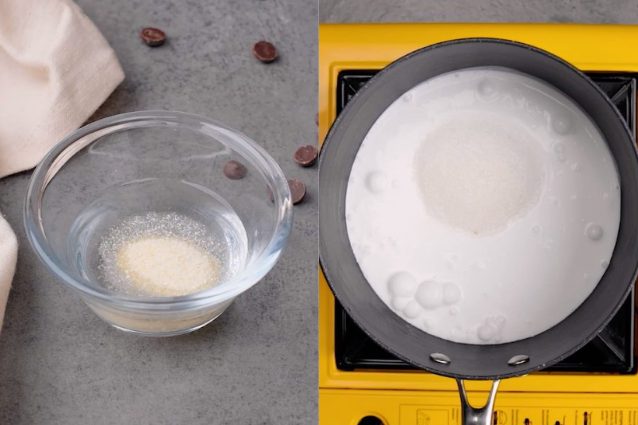;Resize,width=712;)
In a bowl mix together gelatine with water, and set aside.
In a bowl mix together gelatine with water, and set aside.
In a pot add heavy cream, milk, sugar, and vanilla extract, and cook on medium heat.
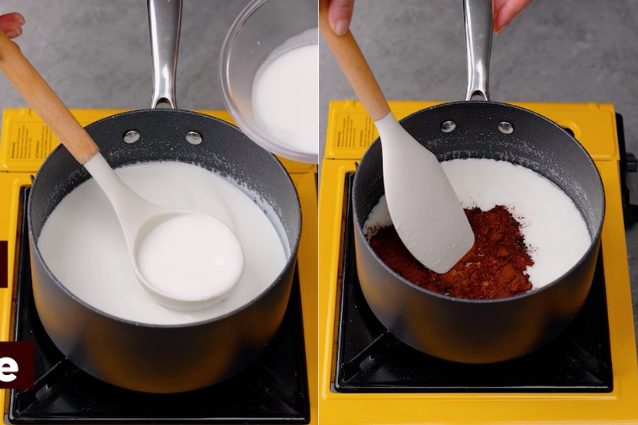;Resize,width=712;)
In a pot add heavy cream, milk, sugar, and vanilla extract, and cook on medium heat.
Add in gelatine mix well and take out about 400 ml (1 ¾ cups) and set aside.
Add cocoa powder and continue cooking on low heat.
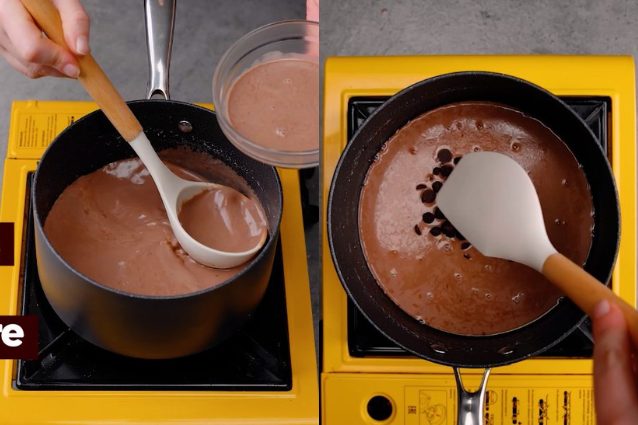;Resize,width=712;)
Add in gelatine mix well and take out about 400 ml (1 ¾ cups) and set aside.
Take out about 400 ml (1 ¾ cups) again.
Add the chocolate to the mixture in the pot.
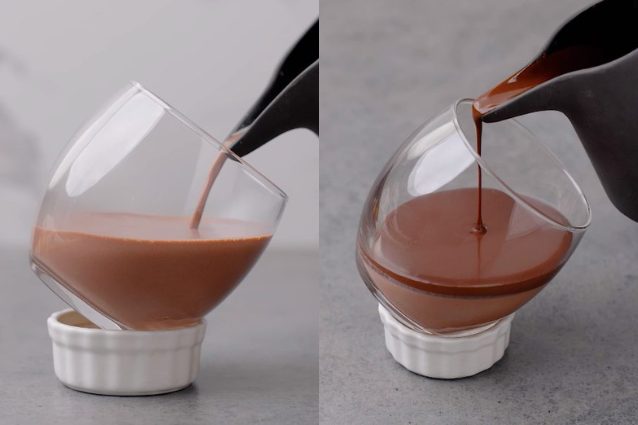;Resize,width=712;)
Add cocoa powder and continue cooking on low heat.
Pour the first layer into the glasses and refrigerate for 40 minutes.
Pour the chocolate layer and refrigerate for 30 minutes.
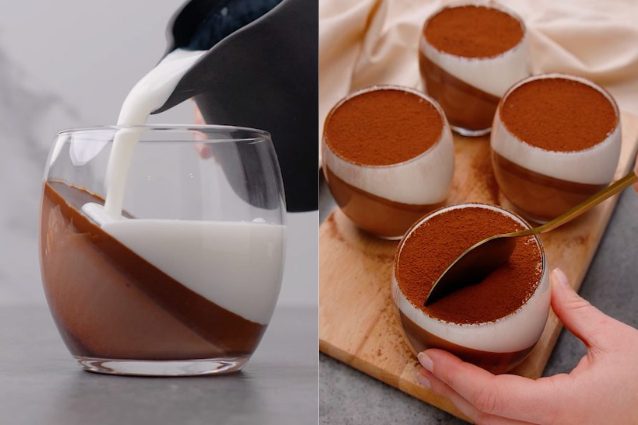;Resize,width=712;)
Take out about 400 ml (1 ¾ cups) again.
Finish with the white layer and refrigerate for 40 minutes.
Sprinkle with cocoa powder and serve.
;Resize,width=767;)


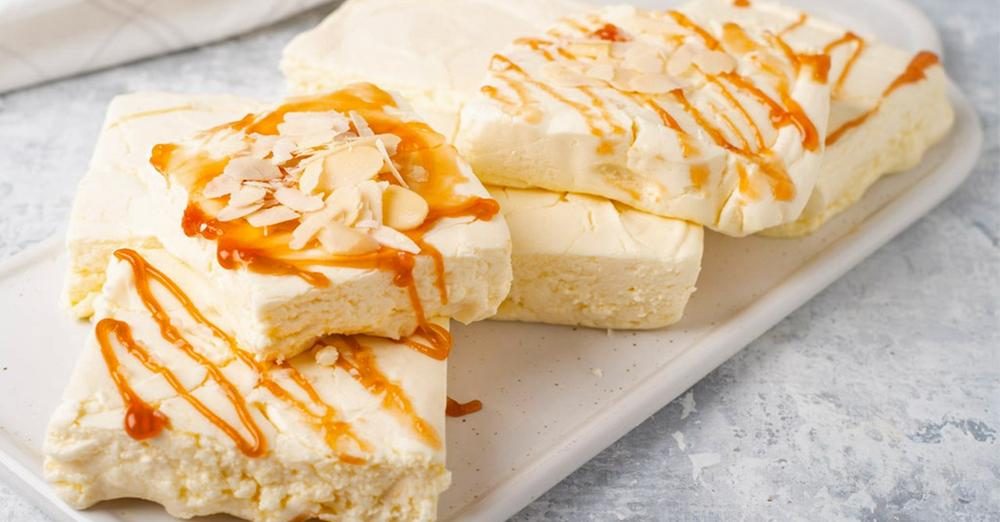;Resize,width=712;)
